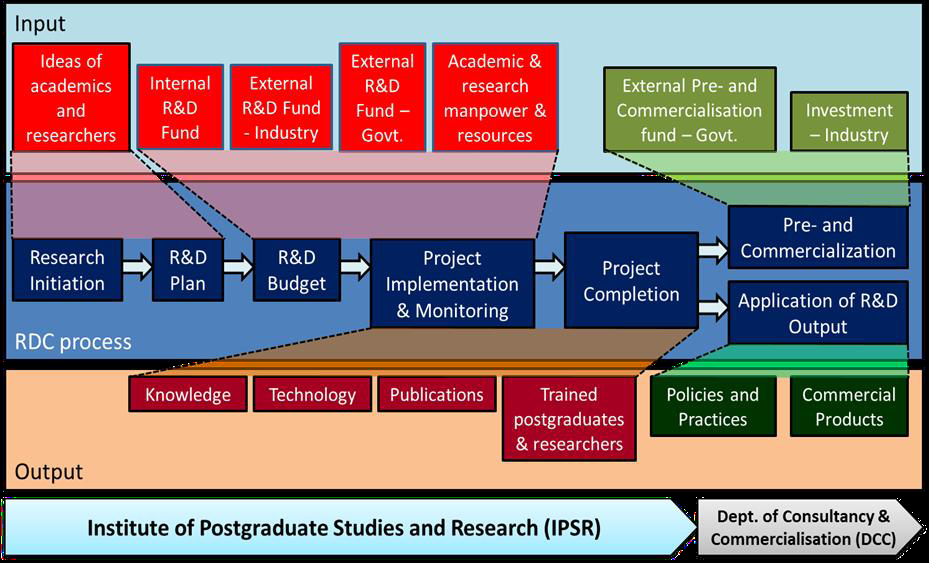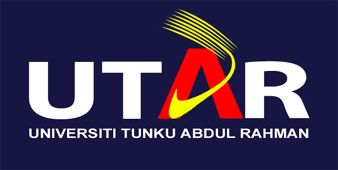Research, Development & Commercialisation in UTAR

In the year 2012, Universiti Tunku Abdul
Rahman (UTAR) continues to make progress and gain recognition as one of
the leading research universities in Malaysia. This is the third annual
report on the various aspects regarding Research & Development of the
university. The Faculties, Research Centres and supporting units made
significant progress in the year 2013 as can be seen their respective
reports.
In today‘s highly competitive and globalised
environment, it is imperative that organisations such as universities
continuously enhance their roles in knowledge and value creation to ensure
their relevance to the economy and society. Research, development and
commercialisation (RDC) thus become the key activities of universities.
UTAR, being one of the many institutions of higher learning in the
country, continues to focus and excel in RDC to ensure its long-term
survival, relevance and recognition. UTAR has defined and continues to
refine its direction and approach in transforming itself into a world
recognised research-focused university.
Research Roadmap of UTAR
To achieve worldwide recognition, it is
imperative that UTAR focus and excel in research, development and
commercialisation (RDC) activities. Hence, a 5-year research roadmap (2010
– 2014) for UTAR has been defined and announced to the university
community in Aug 2009.
This
research roadmap is an outline of the important outcomes and the
corresponding key performance indicators (KPIs), the recommended
approaches and steps for UTAR to pursue in order to achieve Research
University status as defined by the Ministry of Higher Education
(MOHE) of Malaysia (known as Ministry of Education (MOE) Malaysia since
May 2013). Clear and measurable key performance indicators (KPIs) have
been defined and relevant benchmarks have been set in the roadmap.
To perpetuate UTAR further into realizing its
goals, the "UTAR Research, Development and Commercialisation: Enhancement
Strategy and Plan for 2013" encompassing detailed improvement plans for
Human Resource Development, Research Funding, Postgraduate Programme
Promotion and Intake, Data Management & Reporting and UTAR Internal
Research Funding Allocation was drawn up.
Research, Development and Commercialisation
Process in UTAR
In UTAR, the relevant organisation structure,
support and services are shaped and streamlined based on the research,
development and commercialisation process chain as depicted in Figure 1.

Figure 1: Process Chain, Input and Output
for Research, Development and Commercialisation in UTAR
In UTAR, the entire RDC process chain is
handled by the following institute and department:
1. Institute of Postgraduate Studies and
Research (IPSR);
2. Department of Consultancy and
Commercialisation (DCC).
IPSR consists of two main units:
-
Research and Development Unit (RDU);
-
Postgraduate Studies Unit (PSU).
R&D management and the facilitation of
postgraduate studies are two important aspects in every established
research university. With both units managed under IPSR, UTAR hopes to
achieve coherence and synergy between the two aspects such that greater
and more significant output and impact can be generated.
In recent years, IPSR has focused and worked
on various facets of the RDC process chain to further enhance the
processes and outputs in UTAR.
Research Initiation
-
Good quality research ideas can only come from an academic and
research community that is highly motivated and has strong healthy
research culture and diversity of disciplines and specialisations. Thus
far, much effort has been spent for such purposes.
-
For the
year 2012, 1 additional research centre had been established and as at
December 2012, 25 research centres were available to group researchers
for their activities such that more cooperative and comprehensive
research projects, better facility and resource utilisation, etc. can be
enhanced.
-
Frequent
discussions, dialogues and workshops among researchers of different
research centres, background and disciplines are held to stimulate more
research ideas across discipline/s and relevant to the socio-economic
problems faced in the country.
Research Plan
-
Guidance and support are constantly provided by IPSR to assist
academic staff and researchers of UTAR to transform ideas into feasible
research project plans.
R&D Budget and Funding
-
IPSR continues to look out for additional potential external sources
of funding for research activities in UTAR. Such information are
constantly disseminated to the university community; support and advice
provided so that a good match between the interests of the researchers
and the funding agencies can be attained and thus enhancing the success
rates of fund biddings.
-
Internally, an annual research funding allocation of RM3 million has
been set aside since 2010 under the UTAR Research Fund (UTARRF) scheme.
The allocation is intended to serve as seed funds to kick-start
implementation of new projects with good potentials. In years 2011 and
2012, the amount of this seed fund was increased to RM5 million
respectively to enable additional and larger scale projects to be
initiated.
Project Implementation and Monitoring
-
IPSR provides the support and services required throughout the
research project implementation such as project financial account setup
and maintenance, procurement, manpower sourcing, progress monitoring and
report, output measurement, etc.
-
Close monitoring of project progress and outcome measurement have
been one of the main focuses of IPSR. For this, IPSR facilitates to
ensure that projects have been carefully planned such that deliverables
and outcome are measurable and clearly mapped to major research key
performance indicators (KPIs) of individuals, departments, faculties and
university.
DCC and Research Commercialisation
It is strongly instilled in UTAR researchers that researchers should not stop working on a project when the associated research work has been completed. Project completion resulting in some postgraduates being trained and journals/publications produced are simply not sufficient justifications for the amount of funding and other resources invested in the project. UTAR strongly believes that further steps should be taken to explore on how the findings and output of the project can be applied in real life. Hence, DCC takes on the task to look into the post-completion phase of research projects in UTAR.
DCC continues to work closely with IPSR in year 2012 to further enhance the transition of research projects into commercialisation phase. Among the steps taken are as follows:
-
Support, guidance and advice on commercialisation process have been
further strengthened to minimise problems and hindrances faced by
researchers to commercialise their research output/s;
-
Seminars and workshops on various aspects of commercialisation have
been conducted for awareness enhancement and information dissemination;
-
Constant dialogues, discussions and match-making with external
parties such as venture capitalists, commercialisation seed funding
agencies, private corporate industries, etc. have been held.
Research, Development & Commercialisation in UTAR
![]()
|
|
|
In the year 2012, Universiti Tunku Abdul Rahman (UTAR) continues to make progress and gain recognition as one of the leading research universities in Malaysia. This is the third annual report on the various aspects regarding Research & Development of the university. The Faculties, Research Centres and supporting units made significant progress in the year 2013 as can be seen their respective reports.
In today‘s highly competitive and globalised environment, it is imperative that organisations such as universities continuously enhance their roles in knowledge and value creation to ensure their relevance to the economy and society. Research, development and commercialisation (RDC) thus become the key activities of universities. UTAR, being one of the many institutions of higher learning in the country, continues to focus and excel in RDC to ensure its long-term survival, relevance and recognition. UTAR has defined and continues to refine its direction and approach in transforming itself into a world recognised research-focused university.
Research Roadmap of UTAR
To achieve worldwide recognition, it is imperative that UTAR focus and excel in research, development and commercialisation (RDC) activities. Hence, a 5-year research roadmap (2010 – 2014) for UTAR has been defined and announced to the university community in Aug 2009.
This research roadmap is an outline of the important outcomes and the corresponding key performance indicators (KPIs), the recommended approaches and steps for UTAR to pursue in order to achieve Research University status as defined by the Ministry of Higher Education (MOHE) of Malaysia (known as Ministry of Education (MOE) Malaysia since May 2013). Clear and measurable key performance indicators (KPIs) have been defined and relevant benchmarks have been set in the roadmap.
To perpetuate UTAR further into realizing its goals, the "UTAR Research, Development and Commercialisation: Enhancement Strategy and Plan for 2013" encompassing detailed improvement plans for Human Resource Development, Research Funding, Postgraduate Programme Promotion and Intake, Data Management & Reporting and UTAR Internal Research Funding Allocation was drawn up.
Research, Development and Commercialisation Process in UTAR
In UTAR, the relevant organisation structure, support and services are shaped and streamlined based on the research, development and commercialisation process chain as depicted in Figure 1.
Figure 1: Process Chain, Input and Output for Research, Development and Commercialisation in UTAR
In UTAR, the entire RDC process chain is handled by the following institute and department:
1. Institute of Postgraduate Studies and Research (IPSR); 2. Department of Consultancy and Commercialisation (DCC).
IPSR consists of two main units:
R&D management and the facilitation of postgraduate studies are two important aspects in every established research university. With both units managed under IPSR, UTAR hopes to achieve coherence and synergy between the two aspects such that greater and more significant output and impact can be generated. In recent years, IPSR has focused and worked on various facets of the RDC process chain to further enhance the processes and outputs in UTAR.
Research Initiation
Research Plan
R&D Budget and Funding
Project Implementation and Monitoring
DCC and Research Commercialisation
It is strongly instilled in UTAR researchers that researchers should not stop working on a project when the associated research work has been completed. Project completion resulting in some postgraduates being trained and journals/publications produced are simply not sufficient justifications for the amount of funding and other resources invested in the project. UTAR strongly believes that further steps should be taken to explore on how the findings and output of the project can be applied in real life. Hence, DCC takes on the task to look into the post-completion phase of research projects in UTAR.
|
